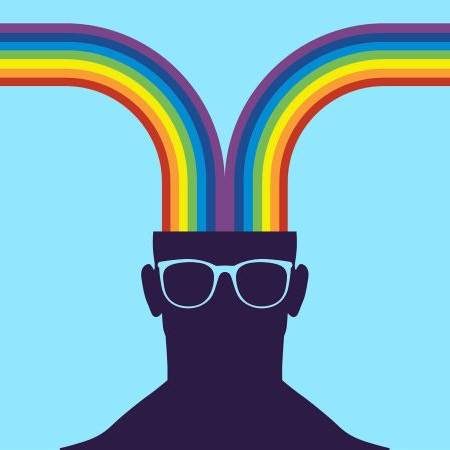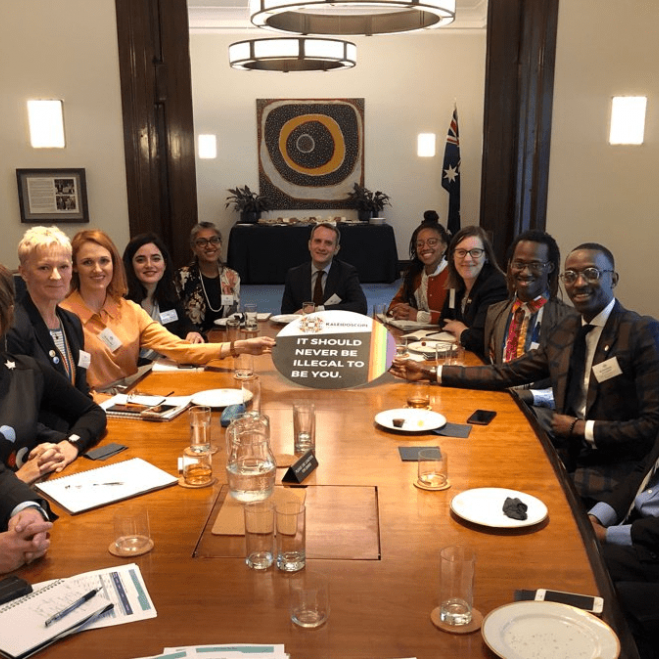 Business Owner Apologizes for Homophobic Comments
Business Owner Apologizes for Homophobic Comments
Earlier this week, I wrote an article about John Adams, the Concrete Flooring, Inc. business owner who gay-bashed a lesbian via Facebook when she requested LGBT-friendly dining suggestions on a foodie group page.
I shared the story because hate has to stop and those who exemplify hate need to be called out. Hate has wreaked havoc on our great nation over the past year to a level I never imagined. So much so, it has created an atmosphere of fear, anger, depression, and despair in our nation.
So, when I heard about a small-town business owner lashing out with horrible, homophobic words at a loving wife who simply wanted to take her partner out for a romantic dinner, I was furious. The gall of a homophobic, straight man to turn a request so sweet and genuine into something so hateful!
After speaking with the victim, Sarah Allen, to fully understand her perspective, I researched the business owner’s personal Facebook page and business website. What I found didn’t surprise me. His personal page epitomized the stereotypical bigot – a white, cisgender, Republican Trump supporter. I even found humour in a meme on his page that ridiculed people for kneeling and disrespecting veterans but spelled the word “veteran” incorrectly. “Uneducated, too,” I thought as I began typing. “I’ll teach him a thing or two about respect.”
At first, I didn’t include his business name and contact info for fear he might come at me with libel or threats. After all, I didn’t know this man and, from what I saw, he was an angry person who didn’t care about hurting others. Not to mention, my contact info isn’t hard to find. But with the urging of a few friends and colleagues in the industry, I felt it needed to be done.
Still, I did not ask people to boycott his business, although I assumed many reading the article would do so. Rather, I focused on supporting Allen, who is also a business owner in the southwest Florida region, and encouraged readers to visit her restaurant.
The moment I clicked “publish,” I felt satisfied and nervous at the same time.
I shared Allen’s story with as many people as possible, asking them to reshare and retweet to everyone they knew. I was adamant about making a statement and speaking up for those without a voice.
To no surprise, within 24 hours, the article had been read over 4,000 times. So, I kept retweeting the article, getting braver and bolder each time I clicked the “post” button. I almost felt safe behind my computer screen.
Later that evening, or rather, early the next morning at 1:00 AM, I received an email from a man named Anthony Pepicelli out of Washington, D.C. Pepicelli wrote, “I recently read your article regarding the response of a business owner and a couple looking for an LGBT friendly restaurant. In this article, you link John Adam’s business and contact info. I pride myself on protecting innocent souls, so I called John and gave him a piece of my mind. I explained to him how hurtful his comments are and how an action so simple can create such a major cause and effect on other peoples’ lives. What I got in return was a bit unexpected; he was more apologetic than I could have ever imagined. He’s also a broken man going headfirst into a life cancer is destroying for him.”
I was flabbergasted. I didn’t expect this kind of response either. I wanted this man to be a villain, a horrible human being, justifying my need to write this article. I had already created a plan of action in case he attempted to contact me or go after me for libel. “Perhaps he’s just trying to protect his business,” I reasoned, still sceptical.
I continued reading the email. “John and I ended up having a 17 minute conversation that resulted in a lot of tears and exposure of his weakened heart. He’s willing to do whatever it takes to accept his damages and make something right.”
Pepicelli suggested I reach out to Adams, in the hopes that good might come from evil.
It wasn’t two minutes later that I saw the name “John Adams” flash across my computer screen. I clicked “open.”
The email read, “My name is John Adams. I am the person that posted that horrible thing on Facebook and I’m here to try my best to apologize. I’m not apologizing because I’m getting responses back, because I’m not. I’m apologizing because I’m truly sorry for what I said.”
He continued, “I want the LBGTQ Community to know that I’m sorry for causing any pain or hurt or anything of that nature. Not just to that person, but to the entire LBGTQ community.”
Again, I was sceptical. So I replied, “I have to know, what would possess you to write something so horrible? The woman was asking you for suggestions and you gay-bashed her for doing so. You say you’re not that type of person, but I can’t understand how those words can come from someone who claims to be supportive of LGBT people. Please explain and I will consider sharing a new article with your apology to the community.”
He replied, “For the past 15 yrs I have been with my soulmate. Three years ago, she was diagnosed with cancer. At that time, her doctor told me privately that she may have 8 quality years ahead. Today, I see that time frame diminishing greatly. In the last 3 weeks, she has gone downhill tremendously. Now my 25 yr old son, with his daughter, has moved in because he lost his home and now I have to help them. Between work, my son, my granddaughter, and [my girlfriend’s] cancer, I have no time to be, well to be me. I stress out a lot because of it. The stress of my life has turned me into a person, at times, that I don’t even know.”
I responded, “My wife also had cancer. I know the fear and the sadness of supporting someone through that process. I also know the anger that can come from it. Like you, I love and support my partner and want the best for her. My needs as an LGBT person are no different than yours. So let’s learn to love and respect one another. My best to your girlfriend. ”
Adams went on to share that his gay best friend passed from AIDS years ago and the night he read Allen’s post was the anniversary of his friend’s death. Although one might think a comment of sympathy would have resulted, the raw emotions felt in that moment spewed in anger at the gay community, a community so closely connected with his friend’s illness.
>When Pepicelli called him earlier that day and called him out on his comment, he said he was hurt to the core. “I never thought of myself as anyone but a caring person. Tony and I talked for almost an hour and I explained to him almost what I’m explaining to you. If what he said to me could cause me so much pain, what did I think I would cause someone with my words?”
Several emails and apologies later, I almost felt sympathy for this man who had attacked one of my own LGBTQ community members. I didn’t want to have compassion for a white, cisgender, Republican Trump supporter, but I did. I asked to call him the next day to continue our conversation, as the hours had passed and it was nearing 3:00 AM.
Today, I spoke with Adams, who was calm and vulnerable. He continued to apologize and shared that he had since done some research on the LGBTQ community and was shocked by what he found. He even went so far as to ask how he could be a part of the LGBTQ community. His question made me smile and I considered, in jest, to tell him what he would really need to do, but I simply replied, “Learn. Get involved. Support the community. We’ll then consider you an ally.”
I then thanked him for his willingness to learn but emphasized how fearful the LGBTQ community is of losing rights due to the current administration, especially our transgender brothers and sisters. He listened intently to my reasons and agreed to learn and do better.
Adams has since offered to take the ladies out to dinner as an apology for his remarks, or at the very least, to purchase a gift card for them to enjoy a romantic evening together. Although appreciated, Allen’s wife replied, “I really don’t want anything from him. Noticing his wrong is more than enough.”
Adams has also agreed to seek counselling to deal with his unresolved anger.
Toward the end of our conversation, he thanked me for my time and said, “I believe it was Kennedy who said, ‘a conversation can move mountains.’” Although the actual quote is, “faith can move mountains,” which originated from the Bible in Matthew 17:20, the sentiment was shared, and although not a religious person, I have a little more faith today than I did twenty-four hours before. Perhaps we might all benefit from more conversation, fewer assumptions, and a little faith.




